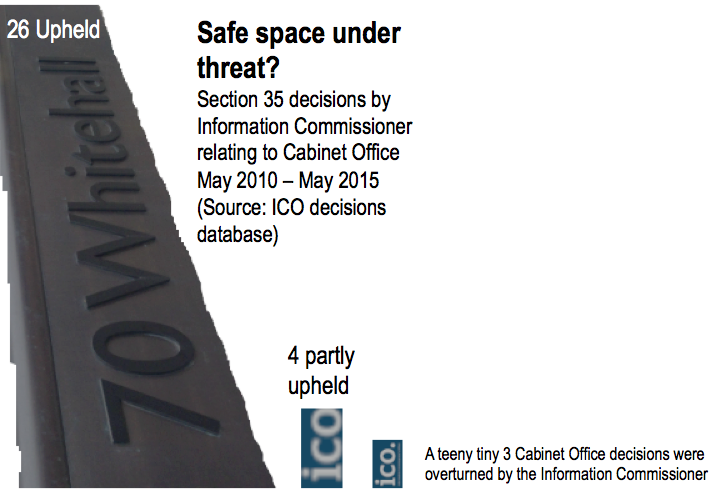An FOIMan info-graphic.
Last week an FOI Commission was set up by the government, and one of its aims is to consider “whether the operation of the Act adequately recognises the need for a ‘safe space’ for policy development…”. The section 35 exemption described in the last Exemption Index post can only be used by central government and it is designed for exactly that purpose. The Commission may find the image above helpful in reaching a judgment.
Incidentally, the three decisions that were overturned were refusals to disclose:
- the number of times the “Reducing Regulation Committee” has met;
- minutes of Cabinet Meetings relating to the 2003 invasion of Iraq;
- and information relating to the takeover of Rowntree’s in 1988.
Civil servants who fear their advice to Ministers on important current issues will be disclosed are overestimating the power of FOI…
Update (27 July 2015)
The post above was a bit of an experiment, prepared in a hurry. It was only afterwards that I realised that the figures here are just the tip of the iceberg.
If you look at the Ministry of Justice’s annual reports on government FOI performance, you can see how many FOI requests were received by the Cabinet Office over a comparable period (it would be difficult to directly correlate the two sets of statistics, but for these purposes the five year period 2010-2014 should be close enough). You can also see how many times the Cabinet Office applied the section 35 exemption over this period:
Year |Requests received|s.35 used
2010 1176 75
2011 1679 115
2012 1607 103
2013 1759 79
2014 1660 111
Total 7881 483
In other words, the use of the exemption for policy development and formulation, protecting the safe space which the government believes to be under threat, went unchallenged 93% of the time. The three cases that the Commissioner overturned represent approximately 0.6% of the use of s.35 by the Cabinet Office. (Taking into account the partially overturned cases, it rises to 1.5%).
I should also say that the reason I selected the Cabinet Office was that they use this exemption more than any other government department.


